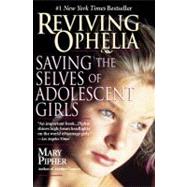
Note: Supplemental materials are not guaranteed with Rental or Used book purchases.
Purchase Benefits
Looking to rent a book? Rent Reviving Ophelia : Saving the Selves of Adolescent Girls [ISBN: 9781594481888] for the semester, quarter, and short term or search our site for other textbooks by Pipher, Mary (Author). Renting a textbook can save you up to 90% from the cost of buying.
| Preface | 11 | (6) | |||
|
17 | (12) | |||
|
29 | (16) | |||
|
45 | (29) | |||
|
74 | (27) | |||
|
101 | (14) | |||
|
115 | (16) | |||
|
131 | (15) | |||
|
146 | (20) | |||
|
166 | (20) | |||
|
186 | (17) | |||
|
203 | (29) | |||
|
232 | (16) | |||
|
248 | (12) | |||
|
260 | (22) | |||
|
282 | (13) | |||
| Recommended Reading | 295 | (2) | |||
| Index | 297 | (8) | |||
| A Reader's Guide | 305 |
The New copy of this book will include any supplemental materials advertised. Please check the title of the book to determine if it should include any access cards, study guides, lab manuals, CDs, etc.
The Used, Rental and eBook copies of this book are not guaranteed to include any supplemental materials. Typically, only the book itself is included. This is true even if the title states it includes any access cards, study guides, lab manuals, CDs, etc.
Reviving Opheliais my attempt to understand my experiences in therapy with adolescent girls. Many girls come into therapy with serious, even life-threatening problems, such as anorexia or the desire to physically hurt or kill themselves. Others have problems less dangerous but still more puzzling, such as school refusal, underachievement, moodiness, or constant discord with their parents. Many are victims of sexual violence.
As I talked to these girls, I became aware of how little I really understood the world of adolescent girls today. It didn't work to use my own adolescent experience from the early 1960s to make generalizations. Girls were living in a whole new world....
Even in our small city with its mostly middle-class population, girls often experienced trauma. How could we help girls heal from that trauma? And what could we do to prevent it?
This last year I have struggled to make sense of this. Why are girls having more trouble now than my friends and I had when we were adolescents? Many of us hated our adolescent years, yet for the most part we weren't suicidal and we didn't develop eating disorders, cut ourselves, or run away from home....
But girls today are much more oppressed. They are coming of age in a more dangerous, sexualized, and media-saturated culture. They face incredible pressures to be beautiful and sophisticated, which in junior high means using chemicals and being sexual. As they navigate a more dangerous world, girls are less protected.
As I looked at the culture that girls enter as they come of age, I was struck by what a girl-poisoning culture it was. The more I looked around, the more I listened to today'smusic, watched television and movies and looked at sexist advertising, the more convinced I became that we are on the wrong path with our daughters. America today limits girls' development, truncates their wholeness, and leaves many of them traumatized....
What can we do to help them? We can strengthen girls so that they will be ready. We can encourage emotional toughness and self-protection. We can support and guide them. But most important, we can change our culture. We can work together to build a culture that is less complicated and more nurturing, less violent and sexualized and more growth-producing. Our daughters deserve a society in which all their gifts can be developed and appreciated. I hope this book fosters a debate on how we can build that society for them.